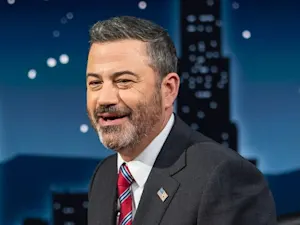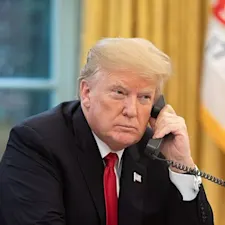
4 Promises From Donald Trump on Day 1
President Donald Trump being sworn in on January 20, 2017, at the U.S. Capitol building in Washington, D.C. Photo courtesy of the White House. Public domain.
Donald Trump's campaign for re-election was marked by a series of bold promises, particularly regarding his agenda for Day 1 of his presidency. As with any newly elected leader, the first day symbolizes not just the beginning of an administration but also an immediate opportunity to enact priorities. Trump's proposed Day 1 plans and the general expectations surrounding a president's first day in office offer a fascinating glimpse into leadership transitions and the weight of political promises.
What Happens on a President's First Day?
A president's first day in office is steeped in tradition and urgency. The day begins with moving into the White House, a logistical feat often referred to as "moving day." Outgoing and incoming presidents and their families swap residences within hours, facilitated by the White House staff. Meanwhile, the new president signs initial executive orders, delivers statements on their immediate priorities, and meets with key advisors. Inauguration Day itself, which precedes this first official day, typically features celebrations and formalities, but the reality of governing sets in immediately thereafter.
The first day can also be a platform for setting the tone of the presidency. It's a day to showcase readiness and signal to the public that campaign promises will be addressed without delay. Past presidents, such as Barack Obama and Joe Biden, used this time to issue executive orders tackling major campaign themes.
Trump's Day 1 Promises: A Bold Agenda
In his 2024 campaign, Trump frequently emphasized an aggressive approach to reversing policies from the previous administration. These promises reflect a blend of political priorities and campaign rhetoric.
Immigration Crackdown
Trump pledged to launch the "largest deportation program in American history" on Day 1, as reported by U.S. News, focusing on removing undocumented immigrants with criminal records. He proposed using local law enforcement and the National Guard to expedite deportations. Additionally, Trump vowed to reinstate his first-term border policies, such as the "Remain in Mexico" policy for asylum seekers. He also sought to end birthright citizenship — a practice protected under the 14th Amendment — though legal challenges would likely hinder this promise's immediate implementation.
Energy Policy Overhaul
Another priority was dismantling Biden-era energy initiatives. Trump promised to "drill, drill, drill," U.S. News Reports, by accelerating federal drilling permits, restarting pipeline projects, and halting clean energy mandates. These actions were framed as part of his broader strategy to combat inflation by reducing energy costs. However, many experts noted that such measures would not yield immediate economic impacts due to regulatory and logistical hurdles.
Pardons and Legal Changes
Trump reportedly plans to review cases of January 6 defendants and issue pardons to those he believes were unjustly prosecuted stating, "I am inclined to pardon many of them. I can't say for every single one, because a couple of them, probably they got out of control," as reported by BBC. According to the Department of Justice (DOJ), more than 1500 people have been charged with federal crimes in connection with the Capitol riot, as reported by U.S. News.
Trump also hinted at a swift restructuring of the DOJ, including appointing new leadership. These moves, however, would face significant scrutiny and opposition from various quarters.
Ending the War in Ukraine
Trump claimed he could end the war in Ukraine "in a day," as reported by BBC, although specifics on how this would be accomplished were vague. While facilitating peace talks might be within his influence, achieving a rapid resolution to such a complex conflict was widely seen as improbable.
Presidential Promises: Action Versus Rhetoric
Historically, Day 1 promises serve more as symbolic commitments than concrete deliverables. A president's ability to implement sweeping changes is constrained by legal, logistical, and political realities. For instance, while Trump could issue executive orders reversing certain policies, major structural changes like immigration overhauls or altering constitutional rights require legislative or judicial approval.
Trump's statements reflect his intent to leverage executive power — much like his previous term — but even executive actions are subject to challenges in court and pushback from advocacy groups.
The Role of Public Perception
Trump's bold promises resonate strongly with his base, underscoring his image as a decisive leader. For his supporters, Day 1 promises are seen as proof of his determination to enact rapid change. Critics, however, argue that such promises oversimplify complex issues and risk deepening political divides.
A Balancing Act
For any president, the first day is a balancing act between fulfilling campaign promises and navigating the realities of governance. The power to issue executive orders, appoint officials, and engage with Congress provides immediate tools, but broader ambitions often face delays and compromises.
Donald Trump's Day 1 agenda captures the ambitious nature of modern presidential campaigns, where promises are designed to inspire and mobilize voters. While his proposed actions may not all materialize on the first day — or at all — they highlight the enduring power of rhetoric in shaping political discourse. As history shows, the legacy of a presidency is built not on the promises of a single day but on sustained action and policy outcomes.
References: Presidential Inaugurations: Traditions & Transitions | Deportations, Drilling and Pardons: Donald Trump's 'Day One' Promises | What Trump Could Do on Day One in the White House | Trump Said Remain in Mexico Will Start on 'Day 1'. Here's Why it Won't























